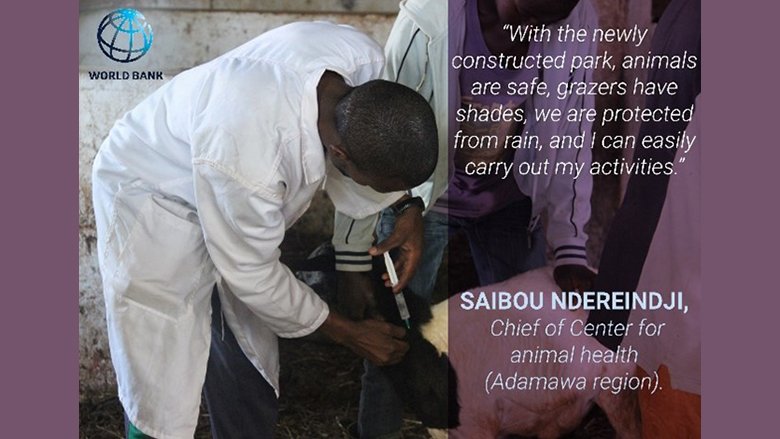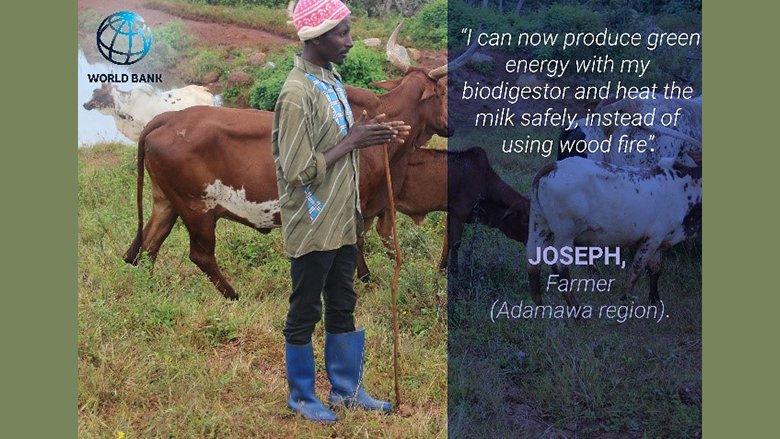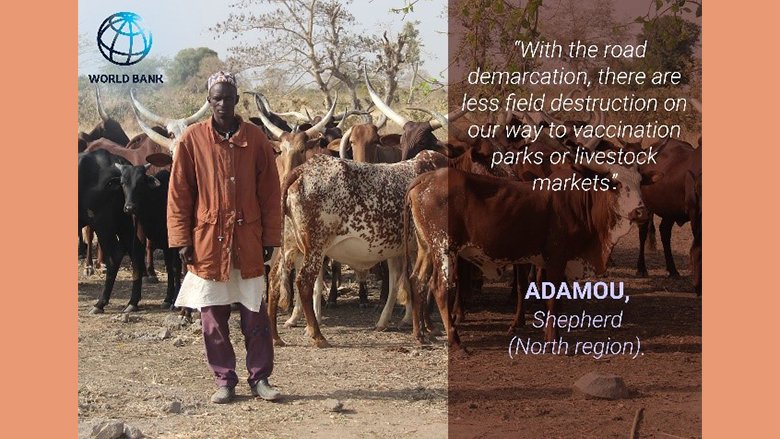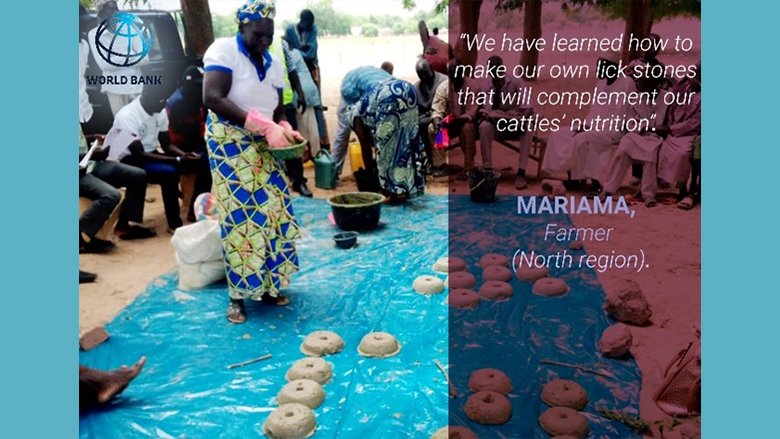Challenge
The pastoral livestock production system in Cameroon faces many constraints, including limited access to inputs; degraded pasture lands; limited feed resources; insufficient water points for herds — all of which have been worsened by climate change. Other major constraints concern health and sanitary problems, leading to endemic animal diseases. The poorly organized pastoralist producers are slow to adopt improved animal husbandry practices. Also, they are not equipped to manage access topastoral resources in a sustainable manner, leading to regular conflicts with other users, such as farmers and fishermen. Other challenges include limited availability of advisory services to promote innovative techniques, and very limited access to finance. These factors result in low productivity of local breeds, poor livestock feeding management and animal health, and limited revenues for producers.
The COVID-19 pandemic had a detrimental impact on all livestock production, especially on the imports of improved animal inputs, seeds, feed, and equipment. Specifically, the practice of transhumance was impacted by the restriction of animal movement and livestock products, causing significant disruptions in the market supply systems for all livestock products. This resulted in over-grazing in some areas, causing scarcity and tensions between the farming and grazing populations.
With a fast-growing population and urbanization, there is an increasing demand for livestock products. However, the demand remains unmet and needs to be addressed urgently. The livestock sector contributes 13 percent to Cameroon’s gross domestic product (GDP) and employment, including more than 30 percent of the rural population. Despite an overall annual production of about 266,000 tons of meat, 236,000 tons of milk, 65,000 tons of eggs, and 2,800,000 liters of honey in 2013, the country’s livestock production does not meet national consumption requirements.
Approach
PRODEL aims to reduce the mortality of cattle, thus increasing milk and meat productivity. It focuses on improving production systems, as well as the management of pastoral resources and commercialization. To address the challenges linked to the management of pastoral resources, PRODEL supports the delivery of improved and more timely public animal health services. Target councils are equipped with local management plans for pastoral resources involving local communities. There is also a cost-sharing mechanism for the construction of critical infrastructure to facilitate access to solar pumped water points, cattle tracks, slaughterhouses and cattle markets, feed storage and pastoral land restoration.
PRODEL is promoting a participatory approach through the establishment and capacity strengthening of local committees to manage infrastructure, as well as to play a key role in conflict mitigation.
Results
PRODEL reached out to more than 38,000 pastoralists. Between 2017 and 2022, significant results in pastoral resource management and the resilience of communities have been registered as follows:
- The mortality of young cattle was reduced from 26.9 to 9.1 percent owing to investments to improve animal health. This included the construction of 160 vaccination parks and 98 water points, as well as the improvement of 7,287 ha of pastureland. The mortality of small ruminants was also reduced from 20 to 3.45 percent thanks to three consecutive vaccination campaigns of more than 6 million small ruminants over the national territory to protect the animals against the small ruminant plague. In addition, the quality of veterinary services in the semi-urban and rural areas was improved. The result was in an increase of small ruminants’ post vaccinal immunity from 30 to 71 percent.
- To improve access to markets for the pastoralists, the project rehabilitated 841 km of cattle tracks leading to markets. In addition, 16 markets were constructed. These markets are managed by local committees in collaboration with the local councils.
- The project has strengthened the resilience to climate shocks and conflict for the beneficiary populations. This was achieved through introducing climate-smart livestock practices for animal feeding (such as the production of lick-stone, straw treatment, fodder production, and so on) for about 75,000 livestock producers, including 16,500 women. Moreover, 7,287 hectares of degraded pasture lands have benefited from the planting of improved species. About 6,900 vulnerable households were provided with more than 60,000 small ruminants as productive assets to engage in income-generating activities. In this regard, about 4,500 women were equipped with tools to reduce their workload, including the construction of 100 biodigesters.
- The institutional capacity to address climate shocks was strengthened. The project prepared a contingency plan and trained more than 35 experts at the national, local and community levels in crisis prevention and management.
- The project has improved pastoral resource planning and management, as well as the procurement capacities of the 30 targeted councils. The use of local sourcing for project activities has enabled the development of local markets. Close to one hundred local service providers were introduced to competitive selection processes and improved contract management practices. The shared-cost (95 percent International Development Association [IDA] and 5 percent council resources) mechanism to finance the implementation of the pastoral resource management plan has enabled the mobilization of US$ 1 million from the councils to complement the IDA contribution of US$ 20.8 million.
World Bank Group Contribution
The Livestock Development Project is funded by an IDA credit of US$100 million. One of the project’s components is specifically dedicated to the improvement of pastoral productivity, access to markets, and support for the resilience of pastoral communities, targeting the Far North, North, Adamawa and East regions. This component is financed by US$24 million in IDA funding, with an additional US$1.14 million provided by the councils and US$0.84 million provided by the Government of Cameroon.
Partners
Local consultants were recruited by the project to assist the councils in the implementation of their Pastoral Resource Management Plans (PRMP). Their role was to strengthen the capacity of the council committees in all stages of the preparation and implementation of the PRMP, including the mastery of procurement processes, the monitoring of works, as well as the establishment and capacity strengthening of the local management committees.
Looking Ahead
The Livestock Development Project will end on May 31, 2023. The 30 councils targeted under this project were selected through a competitive process, representing 43 percent of councils with high pastoral potential. The scaling up of the results would involve reaching out to at least 39 additional councils in the same regions, as well as addressing pastoral resource management at the intercommunal level. This will help to support and manage transhumance activities at a higher level. It will also establish a more harmonized approach to the sustainable and inclusive management of resources. At the policy level, the adoption of a regulatory framework to govern the extensive livestock production system will help consolidate the results achieved in a sustainable manner.
Beneficiary Story/Quote
“With the newly constructed park, animals are safe, grazers have shade, and we are protected from rain. Also, I can easily carry out my activities,” says Saibou Ndereindji, Chief of the Center for Animal Health, Adamawa region.
“With the cattle tracks demarcation, there is less field destruction on our way to the cattle markets and water points,” says Amadou, shepherd, North region.



